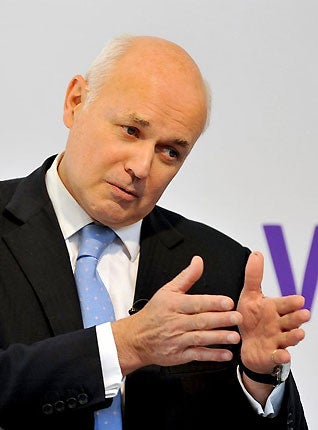Welfare changes are about changing our culture, says Cameron

Your support helps us to tell the story
From reproductive rights to climate change to Big Tech, The Independent is on the ground when the story is developing. Whether it's investigating the financials of Elon Musk's pro-Trump PAC or producing our latest documentary, 'The A Word', which shines a light on the American women fighting for reproductive rights, we know how important it is to parse out the facts from the messaging.
At such a critical moment in US history, we need reporters on the ground. Your donation allows us to keep sending journalists to speak to both sides of the story.
The Independent is trusted by Americans across the entire political spectrum. And unlike many other quality news outlets, we choose not to lock Americans out of our reporting and analysis with paywalls. We believe quality journalism should be available to everyone, paid for by those who can afford it.
Your support makes all the difference.David Cameron today unveiled details of the Government’s long-awaited and controversial plan to reform Britain’s £200 billion benefits system.
At an event in London the Prime Minister and the architect behind the reforms Iain Duncan Smith described how individual benefits will be replaced with a single Universal Credit. The Government claims this will make more than two-and-a-half million of the poorest people in Britain better off and ensure that people are always get more money from work than on benefits.
But at the same time it plans to toughen up the rules on long term sickness and disability benefits payments.
A proposal to cut housing benefit for long-term unemployment benefit claimants has been dropped after complaints from the Liberal Democrats.
Ministers had planned to impose a 10 per cent cut in the housing benefit of those on jobseekers allowance for more than a year. Lib Dem ministers feared the policy would appear callous in a difficult jobs market.
Mr Cameron said the changes would reduce the welfare bill by £5.5 billion in real terms over the next four years by limiting housing benefit, reforming tax credits and taking child benefit away from higher-rate taxpayers.
But he insisted that the Bill was "not an exercise in accounting - it's about changing our culture".
Under the plans a new Personal Independence Payment will replace Disability Living Allowance, supported by a new assessment of individuals that is likely to reduce those eligible to claim the benefit.
There will also be new powers and rules to tackle fraud which costs the taxpayer around £5.2 billion a year.
There will be a new "one-strike, two-strike and three-strike" rule, with a benefit ban of three years for people who offend repeatedly.
Speaking in east London the Prime Minister said: "Never again will work be the wrong financial choice. We're finally going to make work pay - especially for the poorest people in society.
Mr Cameron said the present system needed to be reformed because of a growing benefits culture.
“When the welfare system was born more than today people’s self-image was not just about their personal status or success it was measured out by what sort of citizen they were; whether they did the decent thing.
“That meant that a standardised system of sickness and out-of-work benefits – with limited conditions – was effective. Fiddling the system would have brought not just public outcry but private shame.
“(But) that collective culture of responsibility – taken for granted sixty years ago – has in many ways been lost.
“You see it in the people who go off sick when they could work or the people who refuse job off after job offer.”
Mr Cameron added that the new reforms had been designed to ensure that work always paid and also announced moves to tackle the UK's "sick note culture", pointing out that 300,000 people leave work and claim sickness benefits every year.
The Government's national director for health and work, Dame Carol Black, and David Frost of the British Chambers of Commerce are to lead a review of the problem.
The reforms came under attack from unions, who accused the coalition Government of punishing the unemployed and impoverished for their own misfortunes.
"Long-term unemployment has doubled not because of a sudden increase in work-shy scroungers, but as an inevitable result of economic policies based on cuts that destroy growth," said TUC general secretary Brendan Barber.
"Making low-income working families thousands of pounds worse off through welfare cuts over the next two years to claim that they will be slightly better off in 2013 is an absurd argument that will ring hollow as families suffer the toughest income squeeze for nearly a century."
Join our commenting forum
Join thought-provoking conversations, follow other Independent readers and see their replies
Comments